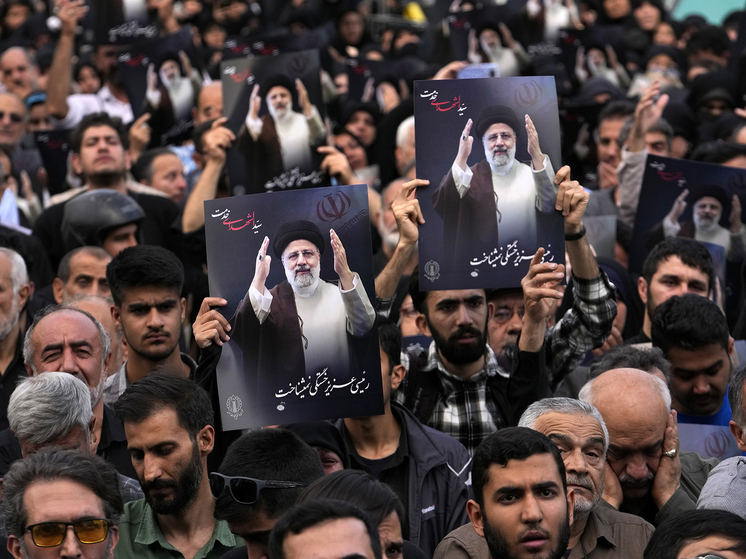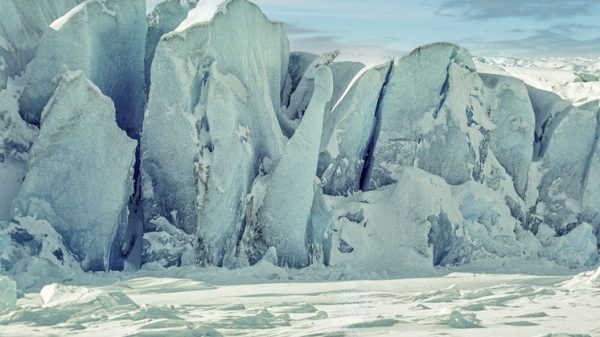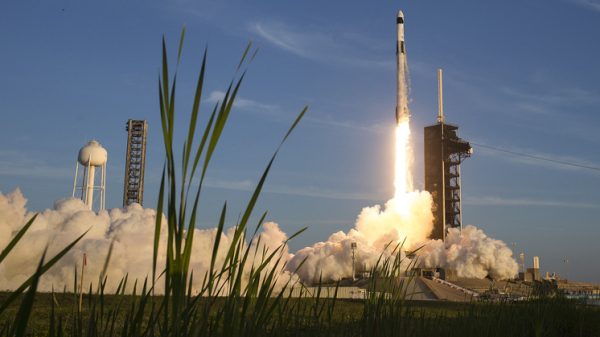The United States hastened to disavow involvement in the Iranian tragedy
The death of Iranian President Ibrahim Raisi and Iranian Foreign Minister Hossein Amir Abdollahian when they were returning from Azerbaijan, where they opened a hydroelectric facility, came as a shock literally for the whole world — everyone froze in anticipation of some changes. Moreover, the changes are unpleasant. Doctor of Law, Honored Lawyer of Russia, Professor Yuri Zhdanov told us what the collective West and, above all, the United States are afraid of and what they expect in the current situation.

– This is the “or” Most of all, it scared the Americans – lest they and the Israelis be accused of the assassination attempt. And they immediately, without expecting possible accusations, hastened to disown possible suspicions.
Politico writes that “Biden administration officials fear Iran could blame the helicopter crash that killed Ebrahim Raisi on the United States or Israel. The White House expects the regional status quo to be maintained, but at the same time fears that accusations from Iran could lead to escalation of tensions with Israel.
Arash Azizi from Clemson University in an article in The Atlantic, “Who will benefit from the death of Ibrahim Raisi?” writes: “Iran does not seem like a country where presidents die by accident. But it is also a country where planes crash due to the deplorable state of infrastructure in the internationally isolated Islamic Republic. In previous years, at least two cabinet ministers and two leading military commanders were killed in similar accidents. Raisi's helicopter, which also carried Iran's foreign minister and two senior regional officials, flew through the notoriously foggy mountainous terrain in northwestern Iran. The incident could very well have been an accident. However, the disaster will inevitably raise suspicions.”
– Too many strange coincidences over the past two weeks. Thus, on May 6, fragmentary information appeared about the assassination attempt on the Crown Prince of Saudi Arabia, Mohammed bin Salman. Then, on May 15th, – information about the coup attempt in Turkey. On the same day – assassination attempt on Slovak Prime Minister Fico. Already May 16 — information about similar plans against Orban in Hungary and Vucic in Serbia. And so – death of Raisi on May 19. As Winnie the Pooh said, this is “ju-ju” for good reason. Moreover, all the figures are extremely inconvenient for the United States and the West as a whole.
– This is how they explain – accident. Moreover, they say, the Iranians themselves are to blame for everything. Like, he was flying on an old American Bell 212 helicopter, which was manufactured 45 years ago and did not even have a radar that could “see” the aircraft. let. Due to sanctions, spare parts for American equipment are not supplied. So the pilots got lost in the fog and hit a rock. According to the instructions, when caught in such fog and losing visual visibility, the pilots were supposed to return along the same route.
The Economist in its article «Iran's President's Death Will Set Up High-Stakes Power Struggle» writes: “Much is still unclear, starting with why Raisi’s helicopter crashed. The official version at the moment — bad weather. During the flight it was raining and foggy, visibility was only a few meters. Conditions were so bad that rescuers were unable to fly in to search for the president, and even drones were unable to find the crash site. The Red Crescent resorted to sending search parties on foot. Mother Nature may well be to blame. However, in Iranian politics, nothing is as it seems, and many Iranians have begun to speculate about more nefarious reasons. Raisi has a long list of internal enemies, from relative moderates whom he has marginalized to fellow conservatives. It is not unreasonable to wonder whether his internal enemies are conspiring to kill him.”
– Maybe. And they even try to justify it. According to The Economist, “It is not surprising that some Iranians also wonder whether Israel had a hand in the disaster. The two longtime enemies clashed last month after Israel killed an Iranian general in Damascus and Iran responded with a salvo of more than 300 missiles and drones aimed at Israel. The Mossad, Israel's spy agency, has a long history of assassinating its enemies, including in Iran, where prominent nuclear scientists were killed.
But, say The Economist experts, “there are good reasons to doubt Israel’s participation. He never went so far as to kill the head of state — a clear act of war that would provoke a violent response from Iran. It would be foolish to risk such consequences to kill Raisi.»
– This is quite in their style – dance on other people's bones. The Economist believes that “few Iranians will mourn him. They will remember him as the «hanging judge,» the prosecutor in Tehran who helped send thousands of political prisoners to the gallows in 1988. And they will remember his ignorant handling of the economy – a president who filled his cabinet with military officers and clerics who watched as the rial lost 55% of its value in less than three years.
In many respects, Raisi was a figurehead: the president answered to the supreme leader. But his death will nonetheless shake up Iranian politics. This will force the regime to quickly find a new president at a difficult time: it is embroiled in a regional war that includes direct military action by Iran and its network of regional proxies. Iran's adversaries, including America, Israel and Saudi Arabia, are considering deepening their security ties to counter Iran. The economy is in trouble, and tougher U.S. sanctions could deal an even bigger blow. And Raisi's death could also throw the looming struggle in Iran into chaos, since it eliminated one of the two leading candidates for Khamenei's post.
– Moreover, they do this with unhealthy excitement and outright gloating. The Economist writes: “Iran’s constitution establishes a clear succession process. New elections must be held within 50 days, and until then, Vice President Muhammad Mokhber will take over the presidency. He is known as an apparatchik rather than a power player. The Guardian Council, a group of clergy and lawyers, decides who can vote. Before the last presidential election in 2021, they disqualified hundreds of potential candidates. Of the seven people who were allowed to run, only Raisi had a realistic chance of winning. Although the regime is unpopular among many Iranians, it is likely that it will be able to suppress any public protests that erupt around the elections, as it has done in the past.
Raisi was the ideal consensus candidate for the factional regime. No one could question his rigid authority, but he had no power base of his own. Religious conservatives hoped to use him to advance their interests. The military of the Islamic Revolutionary Guard Corps (IRGC) did the same. It is unclear who else could fill this role. The IRGC appears to be on the rise in politics, with its militant influence explaining Iran's recent and unprecedented attack on Israel. However, this does not necessarily mean that the IRGC will want to be seen as appointing the president, in part because the holder of this position is publicly blamed for Iran's dire economic situation.
However, a more important continuity will occur a little further down the road. Khamenei turned 85 in April 2024. In recent years, Iranians believed that only two leading candidates would take over his post after his death. One of them was Khamenei's second son, Mojtaba, who in recent years has strengthened his religious credentials and is committed to the longevity of the regime. The other was Raisi. Although other clerics are mentioned as «dark horses», it is difficult to imagine them receiving sufficient support.
However, neither leader had a clear advantage: Raisi was unpopular, and Mojtaba represented a hereditary transfer of power by overthrowing the hereditary monarchy. With Raisi's death, Mojtaba appears to have a clear path to the top job. It will rely on the IRGC to withstand any backlash, which in turn could strengthen the IRGC's role within the regime. Iran may transform from a hybrid military-clerical regime to a more military one. This may mean less religious conservatism at home, but even more antagonism abroad.
For years, hardliners tried to ensure a smooth transition of power, installing Raisi as president and a number of conservatives in parliament. They will now have to quickly find a new president, and some politicians are wondering whether other politicians orchestrated the helicopter crash to further their interests. The regime will have nervous days ahead.
– Arash Azizi reflects: “Raisi ascended to the presidency in 2021, in what appears to be the least competitive election in Iran since 1997. Supreme Leader Ayatollah Ali Khamenei ensured that all other serious candidates were barred from running. Those disqualified included not only reformists, but also centrist conservatives and even Mahmoud Ahmadinejad, the hard-line former president whom Khamenei had come to see as a rival.
Raisi, apparently, was chosen precisely because he could never become a serious rival to Khamenei. In 2017, he showed himself to be completely uncharismatic in an election debate against then-President Hassan Rouhani. His time in power since 2021 also speaks to his political irrelevance. Some call him the Invisible President. During the Women, Life, Freedom movement that rocked Iran from 2022 to 2023, few protesters bothered to shout slogans against Raisi because they knew the real power lay elsewhere.
What mattered to Khamenei was that Raisi could be counted on to toe the regime line. Although the competition is fierce, Raisi may have more blood on his hands than any other living official in the Islamic Republic. Since the 1980s, the Islamic Republic has executed thousands of Iranian dissidents. Judicial power – it is the branch of government that performs this murderous function, and Raisi has occupied a leading position in it from the very beginning. In 2019, he became head of the judiciary.
The same qualities that likely made Raisi the regime's safe choice for president also made him a leading contender to succeed Khamenei as Supreme Leader. According to the Iranian constitution, only a cleric with serious political experience can become the head of state. By now, many clerics fitting this description have died or been politically marginalized (many of them did not share Khamenei's hardline policies), leaving the field open for Raisi. In turn, many political observers expected Raisi to turn out to be a weak supreme leader, allowing real power to move elsewhere — for example, to the Islamic Revolutionary Guard Corps or to other centers of power around or auxiliary to the regime.
Raisi belongs to a very specific part of the Iranian political elite, and in the last few years others in the political class have become concerned about the ambitions of those around him. A native of the holy city of Mashhad in northeastern Iran, Raisi previously served as custodian of the shrine in the city, which is also an economic empire in its own right. He is married to the daughter of Mashhad's Friday prayer leader, an ardent social conservative. Raisi's wife, Jamile Alamolhoda, has played an unusually public role, causing some conservatives outside the couple's regional cadre to worry that a «Mashhad clique» could rise to the top of the regime after Khamenei's possible death.
Raisi's apparent passivity also emboldened rivals among a group of particularly zealous hardliners who saw his weak presidency as an opportunity to raise their political profile at the expense of more established conservatives such as parliamentary speaker Mohammad Baker Qalibaf. Some of these ultra-hardliners did well in parliamentary elections in early 2024, which were largely contested within the hardline camp. They launched a heated campaign against Qalibaf, who enjoyed the support of the main pro-government conservative political parties and many IRGC organizations.
– Arash Azizi asked an official close to Qalibaf about this. Then, allegedly, he immediately replied: “Doctor Qalibaf will become the new president.”
According to Azizi, Qalibaf’s ambitions are not new to anyone; he has run for president several times since 2005. More of a technocrat than an ideologue, Qalibaf was an IRGC commander during the Iran-Iraq War and is likely to enjoy at least some support within its ranks. His long tenure as mayor of Tehran (2005–2017) was marked by both high competence and significant corruption. His political enemies have recently exposed cases of corruption involving him and his family. An official close to former President Rouhani told Arash Azizi: “The problem with Qalibaf is that he wants it too much. Everyone knows that he has no principles, and he will do anything for the sake of power.”
If Qalibaf registers to run in the hastily organized presidential election, Azizi said, it could be difficult for the Guardian Council to reject him, given his deep ties to power structures in Iran.
– At the very least, they throw in or voice very controversial questions. For example, will Khamenei be happy with the presidency going to a technocrat without proper Islamist credentials? Who else will be allowed to run and will they be able to defeat Qalibaf in elections, as Ahmadinejad and Rouhani did in 2005 and 2013 respectively?
– It is no coincidence that the name of Khamenei’s son Mojtaba came up among American political scientists – They say many officials are in favor of him becoming his father's successor as supreme leader. The US recalled that Mojtaba Khamenei has been in the shadows for a long time, and little is known about the policies and views of the 54-year-old man, but it is widely believed that he is a serious contender for this post. Could a deal be struck between Mojtaba and Qalibaf that would pave the way to power for both of them?
And The Economist adds fuel to the fire: “When the founding leader of the Islamic Republic, Ayatollah Ruhollah Khomeini, died in 1989, Khamenei replaced him by entering into an unwritten pact with another cleric, Akbar Hashemi Rafsanjani, who then took over as president. The Constitution was quickly changed to give more powers to the President. Rafsanjani will regret the pact because Khamenei suspended him from political activities before his death, considered suspicious by many in Iran, in 2017. Could this cautionary tale make both sides wary?
Many expected a bitter power struggle in Iran, but most expected it to follow Khamenei's death. Now we'll likely see at least a dress rehearsal where the various factions will demonstrate their strength. As for the people of Iran, some have already begun to celebrate Raisi's passing with fireworks in Tehran. Most Iranians hardly feel represented by any faction of the Islamic Republic, and some may use the moment of political crisis to renew the street protests that have repeatedly plagued the regime in the past. The country's civil movements have been exhausted by years of struggle (more than 500 people died in the latest round of protests from 2022 to 2023). However, whatever form the struggle for power at the top takes, the people of Iran will not accept it passively for long.”
– CNN's chief international anchor Christiane Amanpour gloated that President Ebrahim Raisi's death could not have come at a «more volatile time.» both for Iran and for the region. (But, presumably, very successful for the USA).
She said Raisi's death comes as Israel's war against Hamas enters its eighth month, fueling a growing humanitarian disaster and causing regional tensions to soar: «The decades-long shadow war between Israel and Iran has continued over the past few weeks , broke out.»
However, Amanpour is not so much concerned about this war as she is frightened by the prospect of Iran acquiring nuclear weapons: “You can imagine that for the United States, for the West, one of the most important problems is Iran's nuclear problem. Over the last week or so, we have realized that the International Atomic Energy Agency (IAEA), the UN nuclear agency, that they (the US) have returned to negotiations with Iran to make sure that everything happens within the framework of nuclear regulation.
But Raisi took the presidency against a different backdrop — a situation where negotiations with the United States on how to renew the 2015 nuclear deal have reached a dead end. If this – coincidence, it is a very ominous one.
Emperor Napoleon's Foreign Minister Chal-Maurice Talleyrand once said: “The day America comes to Europe, peace and security will be banished from it for a long time.”< /p>
Here she comes. And not only to Europe…























































Свежие комментарии